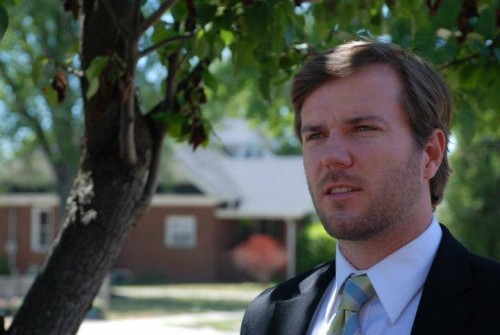The Aim of a Film, by Reed Lackey
3 Oct
I’ve seen films that inspired me, challenged me, provoked me, entertained me, amused me, and bored me. All of these effects, except perhaps the last one, can specifically be intended by the filmmaker and I believe that a fully formed criticism should at least attempt to consider such intentions when evaluating whether or not the film works.
That having been said, it was vividly evident by about ten minutes into Seven Deadly Words—a recent film written and directed by Doc Benson—that the film has an almost singular intention. The premise of the film is that a young pastor named Evan Bennett comes to Egypt Valley Church with big dreams and an even bigger heart. However, he soon encounters profound resistance to certain changes he tries to implement from the established board of elders and deacons who all cite some variation of the “seven deadly words” the film’s title refers to: “We’ve never done it that way before.”
Back-room meetings, subversive lobbying, and even outright physical violence become the weapons of warfare as each side (the stubborn traditionalists and the optimistic revisionists) seeks to gain the upper hand of influence in the future of the church.
Seven Deadly Words behaves like a faux documentary, complete with side interviews of the people involved and even a few “revealing” shots of the documentary crew towards the end. When the film completely commits to this format (as in those side interviews), it is both natural and believable. The problem is that during the supposedly “real” moments between characters where the real drama happens, the script is too on-the-nose, the acting is too broad, and the situations too outlandish.
Except that the situations are barely exaggerations. I happen to have grown up in small-church culture and witnessed firsthand the kinds of political maneuverings the film presents. I wish I could tell you that they were utter fabrications, but the kinds of power struggles on which the primary plot hinges happen every day in some churches.
That is why there is a definite audience for Benson’s film. I would actually suggest that any pastors, elders, deacons, or even heavily involved laymen could benefit from watching this story play out. I should qualify that suggestion by saying that as a piece of entertainment (the kind of let’s-hang-out-this-Saturday-and-catch-a-new-movie vibe), the film didn’t really work for me. Even the amusement factor only shows up a couple of times near the beginning (there’s an early basketball scene that tries pretty hard to be clever). But as an important story illustrating the very real dangers of church politics, I found myself wishing I had more copies to show to certain people.
It was somewhat of an odd moment for me to watch a film that captures its subject so successfully, while simultaneously misfiring on nearly all of the basic, technical filmmaking standards. There is no room for subtlety or nuance in the script, nearly every acting choice feels forced and contrived (except during those aforementioned “documentary” interviews), and most of the shots are staged as rudimentary head shots. At times, it can feel more like a dramatized seminar illustration than a cinematic experience. But there is one aspect of the film where it nearly hits a bulls-eye: a purity of focused intention.
I have to imagine that there was only one reason why Doc Benson would make a film like this, namely to illustrate the destructive patterns of closed-minded influence in religious organizations (specifically churches). If I’m correct in that presumption, then I have to admit that the film and its creator have successfully done that very thing. The dangers of manipulative politics in a church are illustrated with frightening accuracy and even a discussion point or three might come out of viewing this film. And if a film’s effectiveness is gauged primarily by how well it accomplishes what it sets out to do, I’d have to say Seven Deadly Words works pretty well.




No comments yet